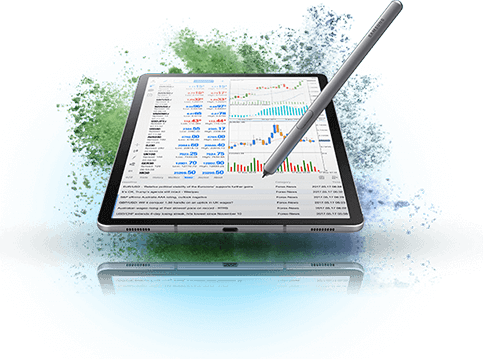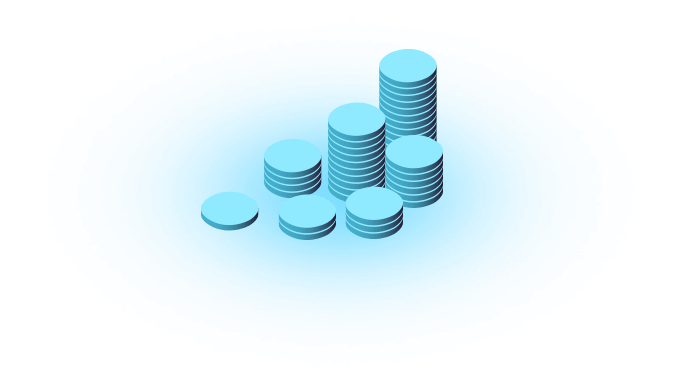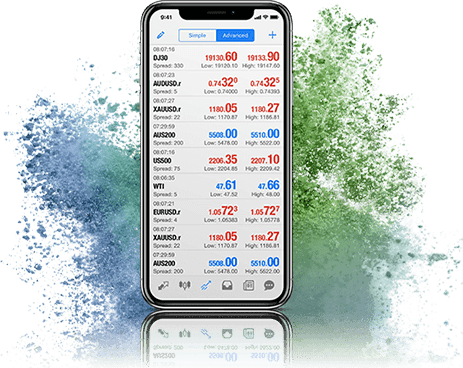Experience Trading
on the Go
on the Go
How Does Politics Affect
the Forex Market?
The forex market is a global marketplace, where individuals, financial institutions, organisations, businesses, and governments from all corners of the world exchange currencies. The daily trading volume of the forex market is in excess of $6 trillion making it the world’s largest and most liquid markets.

What Factors Impact
the Forex Market?
Having such a global presence, the forex market is impacted by various factors. These can be broadly classified into two categories:
Macroeconomic factors: These include interest rate, inflation, trade balance, balance of payments and government debt.
Non-macroeconomic factors: These include politics (diplomatic relations, elections, assassinations), major events (Olympics, pandemics), natural disasters, acts of terrorism, speculation, and sentiment.
Does Political
News Have a Higher
Impact on the Forex
Market than Economic Releases?
Typically, macroeconomic factors related to a country tend to have a much more significant and direct impact on its local currency. However, their impact is usually short-lived. This is because experts from across the world use sophisticated measures and analytics to make predictions of economic releases. Moreover, there are indicators of how good or bad the data might be.
Let’s take the US NFP (non-farm payroll) report for instance. This is the most market moving economic release. Days or even weeks before the release, experts from every corner of the world issue their forecast of the headline figure. Moreover, the initial jobless claims report gives an indication of the strength or weakness of the next NFP headline figure. Let’s say, despite all this, the report misses or beats expectations. Thanks to technological advancements, traders and investors are quick to respond to the report. Yes, there will initially be wide price swings but, after a few hours of this high volatility, the forex market settles again and waits for the next economic data release!
One the other hand, non-macroeconomic factors often do not have a significant impact on the forex market. However, there are times when these factors have a more widespread and long-lasting impact than those of a macroeconomic nature. Among these non-macroeconomic factors is politics.


How Does
Politics Affect the
Forex
Market?
While there are several factors that affect the flow of foreign exchange and cause fluctuations in the value of currencies, traders often ignore the deep impact that politics can have on the forex market.

Politics can cause great uncertainty for traders and investors around the world. This is because political events are typically:
Long drawn - over weeks, months or even years (definitely more than a few hours!)
Largely unpredictable – due to the large number of variables at play
Involving more countries – even elections in one country have implications for allies and adversaries
Some geopolitical events, like Trump’s presidential win, the French elections, the US-China trade war and Brexit caused more significant price swings in the currency market than even the most important economic data released by a country.

Which Political
Factors Affect the
Forex Market?
The diverse political factors that influence the forex market can be categorised into the following:
Political Stability
Countries with a low risk of political uncertainty are more attractive for foreign entities to make investments. Due to this, political stability increases demand for a nation's currency and has a meaningful impact on forex rates. For instance, Switzerland is known for its political stability, maintaining a neutral stance, and staying away from conflicts with other nations. This is why the Swiss franc enjoys a safe-haven status in foreign exchange trading and is also used for hedging risks in other currencies.
On the other hand, protests, coops, and political chaos have a destabilising impact on the economy and weakens the local currency. This reduces demand for the respective domestic currency and increases the risk of holding it.
Government Involvement in the Economy
The extent to which a government controls the economy can have a meaningful impact on the currency. These governments typically manage their currency very closely. However, given the increased mobility of capital in a highly globalised world, such governments need to take increasingly stronger measures to control the economy and currency, resulting in greater uncertainty and, in turn, high volatility in the forex market.
Government’s Fiscal Policy
Fiscal policy involves the government’s plans on spending over a certain period of time. The government collects tax and takes on debt to finance various projects. Higher government spending boosts economic growth, as there is an influx of money into the economy, which propels business activity and is used to pay wages and purchase other products. Therefore, an increase in government spending raises the value of the country's currency.
The benefits of an increase in government spending are short-lived if it is funded by higher national debt rather than through tax collection. An increase in government debt erodes the demand for the local currency and exerts pressure on its exchange rate. Large public debt is also a sign of upcoming instability, as there is a higher risk of default, which deters foreign investors and reduces demand for the currency.
On the other hand, low government debt suggests a more fiscally responsible government and greater economic stability. For instance, Australia’s national debt tends to remain low versus other developed countries, lending support to the Australian dollar.
The corona-virus pandemic is an extremely unique non-macroeconomic event. Border closures and a decrease in labour input have decreased the gross domestic product (GDP) of most nations across the world. The anticipation of lock-downs may have brought about a short-term spike in retail sales and consumer spending but the long-term trends are looking grim. The financial services sector has had to strengthen its risk management strategies and a decrease in lending by banks has been felt by the real estate market. These are all factors that impact the foreign exchange market and emphasise the unique set of political conditions that governments are currently faced with.

Elections
While these are regular events that take place in almost every country, some elections attract more investor focus. During any election race there is a large focus on the economic policies of the respective parties and the potential impact they will have on a country's economy. Moreover, the government has a meaningful impact on the diplomatic relations with other countries. For instance, a government that maintains diplomatic relations may ink trade deals with other countries which strengthens the economy and boosts demand for the local currency. This is recognised as a positive indicator of economic performance as it minimises the risk of political turmoil.
A tightly contested election that has candidates with starkly different economic and cross-border ideologies can cause great uncertainty. This translates into high volatility in the forex market in the run up to election results. For instance, Italy’s elections in 2018 caused significant volatility and a downtrend in the euro, given prospects of a populist government and a possible clash with the EU. There is a perception that Donald Trump and Joe Biden offer drastically different visions for the United States economy. A direct impact on forex trading is inevitable with any currency pair including the US dollar expected to trade noticeably higher volumes than normal.
Government’s Monetary Policy
Apart from fiscal policy, the government has a say in the central bank’s monetary policies. Even countries that favour floating exchange rates do their best to control the demand and supply of money. The central bank of a country influences money supply by making changes in the interest rate. By lowering the interest rate, a country can deflate the value of its currency in a bid to make its exports more price competitive.
Increasing Money Supply in the Economy
The government may decide to print currency notes to increase money supply. Such efforts are termed as quantitative easing and became a popular method in the US and Europe to combat the 2008 financial crisis.
During periods of economic slowdown or recession, governments can inject money into the economy or even into the financial markets. For instance, the US government injected $2 trillion in the economy in March 2020, only to be followed by another $3 trillion package in May, in response to the covid-19 pandemic. In March, the funds had a more direct impact on the financial markets. This is because a large part of the funds was handed out to all American adults, while some were used to increase unemployment benefits. Many people used the funds to speculate on the stock and forex markets. In May, the government distributed funds to healthcare organisations and pharma companies, to provide free coronavirus testing and treatment and conduct research on vaccines. Some of the funds were given to small businesses to cover payroll and overhead expenses in an attempt to limit bankruptcy.
Broadly speaking, political stability, friendly diplomatic relations and fiscal discipline are indicators of economic growth that help strengthen the value of the currency. On the other hand, political unrest, conflict with other countries and poor fiscal decisions can be detrimental to a domestic economy and its legal tender. The allies and enemies of a country can also have a meaningful impact on the currency exchange rate. A strong ally can increase foreign investments in a country, while a strong enemy can increase risk for investors.
Due to all these factors, it is vital for forex traders to remain abreast of political news. Forex traders should focus on major global political events such as the US election and take them into consideration as part of their trading strategy. More importantly, additional focus should be placed on news that influences the currencies in their portfolio. If a large percentage of a traders portfolio involved the US dollar, they should be well informed with respect to political and economic news involving the United States. This would include awareness around the Dow Jones and significant political events such as the 2020 US election.

How Does Politics
Between the US
and
China Affect the
Forex Market?
The US-China trade war is a double-edged sword for the forex market. Deteriorating diplomatic relations between two countries has an impact on their currencies. Added to this is the fact that the US-China standoff is related to trade, which has a much deeper impact on the forex market.
The tug-of-war between the Trump Administration and China began over issues such as theft of Intellectual Property, forced technology transfer, China limiting access to its market, and the preferential treatment provided to the Asian nation’s state-owned enterprises.
By July 2018, the US had imposed tariffs on $34 billion worth of Chinese imports. China protected itself from this situation by devaluing the yuan to negate the impact of the tariffs. Currency devaluation is a common strategy adopted by countries faced by a trade war. This is a logical response to aggressive tariffs and is not a new phenomenon.
Why is it logical? High tariffs imposed by Country A on Country B increases the price of products exported by Country B to Country A. This is a protectionist policy that makes Country B’s products less price competitive in the domestic market of Country A. In an attempt to combat this increase in price, Country B can resort to currency devaluation, which involves lowering the exchange rate between its local currency and Country A’s currency. As Country B’s currency is now cheaper, its exports to Country A regain their price competitiveness.
Why is this not a new phenomenon? For years, Japan’s Prime Minister Shinzo Abe followed a policy of quantitative easing and negative interest rates that kept the yen’s (JPY) exchange rate in check and favoured the country’s exports.
Between July 2018 and August 2019, the US had announced plans to impose tariffs on more than $550 billion worth of imports from China, including commodities like steel, light machinery, and appliances. The Asian nation retaliated with tariffs on more than $185 billion worth of US products. In fact, it raised tariffs on almost all exports from America, from pharmaceuticals to whiskey.
By October 2019, the US-China trade war had already shaved off almost $500 billion from the global economy. This situation worsened with the onset of the covid-19 outbreak.


Impact on the US Dollar
The US dollar began 2018 on a downtrend, mainly due to growth in other leading economies of the world, especially in Europe. The US Dollar Index, which measures the value of the greenback against a basket of major currencies, fell to a low of 88.59 on February 15.
The beginning of the trade war with China resulted in extreme volatility in the US dollar. The greenback then began an uptrend, although it remained volatile amid uncertainties related to the fallout of the US-China trade war. The US Dollar Index hit its 2018 high on November 12, climbing to 97.54, and ended the year at 96.17.
The US dollar strengthened in the first half of 2019. In fact, the greenback was on a clear month-on-month uptrend through the first six months of that year, backed by interest rate hikes by the Federal Reserve, strong economic growth, and a low unemployment rate.
The greenback continued its ascend, albeit at a slower pace, for the next couple of months. On September 3, 2019, the US Dollar Index hit a two-year high and came very close to breaching the 100 mark. Then came a period of intensifying trade war tensions, which saw the US dollar weaken.

Impact on Other Currencies
China stepped up its fight in the trade war by further devaluing its currency. The yuan plummeted nearly 4% versus the US dollar in August 2019, representing its biggest monthly decline in more than two decades. The geopolitical tensions not only impacted the US dollar and the Chinese yuan. It impacted almost all currencies around the world. What made the impact more pronounced and widespread is the trade war was between the two largest economies of the world.
As China devalued its currency, other countries like New Zealand and Thailand implemented a monetary policy to weaken their currencies so that their exports remained price competitive. The Argentine peso, Brazilian real and Turkish lira also plummeted.
Latin American currencies were the most volatile, as their economies are highly dependent on trade. Any news related to the standoff between Washington and Beijing resulted in wide price swings in these currencies. Among G-10 currencies, the Canadian dollar exhibited the highest volatility to political tensions between the US and China, as it is a commodity currency. The Australian dollar was not far behind the Loonie in its response to such news. This is mainly because the tensions impacted the economy of China which is Australia’s largest trading partner.
In December 2019, the US President said the first phase of a trade deal with China would be signed in January 2020. Despite the uncertainties around the details of such an agreement, the pound, the euro and other trade-sensitive currencies rallied, sending the US dollar to a six-month low. This was driven by an increase in investor risk appetite with the prospects of political tensions easing between Washington and Beijing.
The currencies that benefited the most from the geopolitical tensions were those that act as safe havens, namely the Swiss franc and Japanese yen. As you can see, there is a direct correlation between politics and the forex market.

How Does Brexit
Politics Affect
the
Forex Market?
Brexit, or Britain’s exit from the European Union, has had a significant and prolonged impact on the forex market. Here’s a look at the various Brexit developments and how they impacted the British pound, leading to an unprecedented downward spiral extending for more than three years. Here is how it all happened:
On June 23, 2016, the UK voted in favour of exiting the EU. Theresa May formed a government in July, following which withdrawal negotiations began. This sent shockwaves in the markets, resulting in panic selling. The global stock market lost $2 trillion within 24 hours of the results being announced. The British pound tumbled, and the GBP/USD lost almost 8% to mark the biggest single-day selloff since World War II.
The pound lost 15% versus the euro and 17% against the Australian dollar. As uncertainties continued, the pound kept sliding over the next six months, losing almost 20% against the US dollar. On March 29, 2017, when PM May triggered Article 50, which set the date for Britain’s formal departure from the EU exactly two years later, the pound plummeted. The GBP/USD reached a low of 1.2441 that day.
The Brexit withdrawal agreement was published on November 14, 2018, followed by the EU member states endorsing the agreement. Prospects of a no-deal Brexit grabbed the headlines, sending the market in a frenzy. The pound lost around 2% against the US dollar and the euro.
As the agreed date for Brexit (March 29, 2019) approached, the pound became highly volatile, although the general direction continued to be downward. On April 10, the UK and EU27 agreed to extend the Brexit date to October 31, 2019.
In May 2019, the pound started recovering. This was driven by another political event which played a key role in supporting the pound against both the US dollar and the euro. Theresa May resigned as the Conservative Party leader, making way for Boris Johnson to become the Prime Minister. Although markets initially welcomed PM Johnson with a rally in the British pound, soon fear gripped investors as his rhetoric on Brexit toughened and hopes of Britain inking a deal with the EU faded. The pound plummeted on July 28 to hit a 28-month low of $1.2242. The sterling also lost ground against the euro, reaching €1.1004.
Through October 2019, the pound remained mostly range bound, as EU leaders approved UK PM Boris Johnson’s Brexit deal and set the date of November 1 for the agreement to come into force. However, the British currency spiked in December, to reach its highest level in more than a year, on news of Boris Johnson winning the elections.
Finally, on January 31, 2020, the UK exited the EU and the British pound ended the month with significant gains against other major currencies. Although this should have been a stabilising factor, volatility continued. Months after the Brexit, the UK and EU were still negotiating a deal, with “neither breakdown nor breakthrough” on major issues. In fact, in March 2020, the GBP/USD reported a new low of around 1.16.
Not only is Brexit a recent example of how politics can affect the forex market, it is a great example as Brexit has a significant and prolonged impact.
The Bottom Line
The political landscape of a country and its relations with the rest of the world play a key role in the overall economic health and prospects of a country and, therefore, on its currency. Even forex traders who use technical analysis to make decisions need to monitor political news and be aware of the most important events to anticipate fluctuations in the currencies they trade. The need to remain abreast of politics is higher during periods of an economic slowdown as their capacity to cause market fluctuations increases.
Politics can have a more meaningful impact on the forex market than even economic factors. This is because political developments are not onetime events and their outcomes are often more difficult to predict than economic releases. Moreover, political ideologies can influence how closely a government controls the economy and impacts growth through its fiscal and monetary policies.
Broadly speaking, the forex market prefers periods of peace in a country and the absence of conflict between nations. The value of a currency is supported by how pro-growth and fiscally responsible for the government of the country is. That said, political events and uncertainty lead to volatility which is seen as favourable by many forex traders. They view volatility as a vehicle for creating trading opportunities and look to capitalise on them by altering their trading strategy.
 Access 10,000+ financial instruments
Access 10,000+ financial instruments Auto open & close positions
Auto open & close positions News & economic calendar
News & economic calendar Technical indicators & charts
Technical indicators & charts Many more tools included
Many more tools included
By supplying your email you agree to FP Markets privacy policy and receive future marketing materials from FP Markets. You can unsubscribe at any time.
Source - cache | Page ID - 963